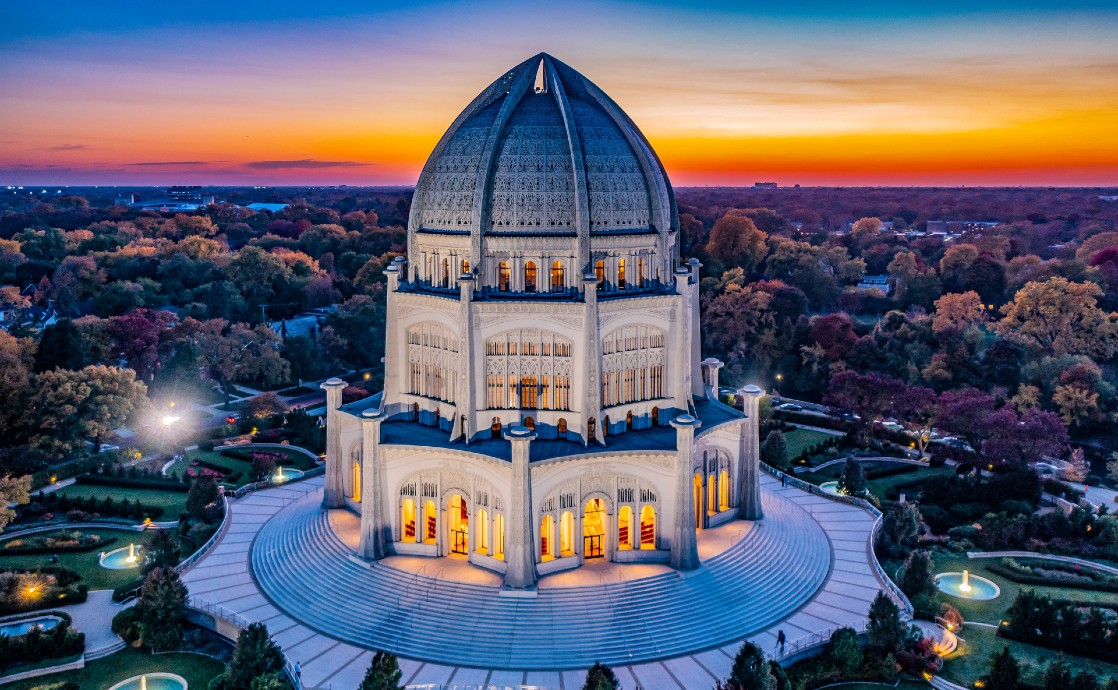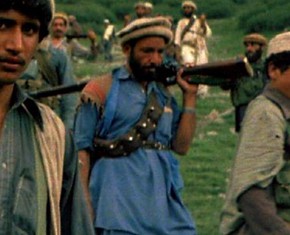The views expressed in our content reflect individual perspectives and do not represent the authoritative views of the Baha'i Faith.
The other day, I met someone who said he was deeply interested in religion. He asked me about my faith, and I told him that I’m a Baha’i. Confused, he said, “I’ve never heard of Baha’i — is it a cult?”
My first response, I’m somewhat embarrassed to admit, was laughter.
Then I told him, “Sorry to laugh, but no, the Baha’i Faith is the exact, one-hundred-and-eighty-degree opposite of a cult.” Clearly curious, he wanted to know more, so we wound up talking at length.
RELATED: Baha’i Principles: The World’s Newest Spiritual Teachings
First, I said, let’s define what a cult is, and then second, I’ll tell you why the Baha’i Faith doesn’t fit any of those criteria — in fact, why it stands in opposition to everything that constitutes a cult. We started by quickly looking up the Britannica definition, which says that cults are characterized by:
… a charismatic leader who exercises total control; an apocalyptic vision (doomsday cult); isolation from society; an emphasis on a transcendent spiritual experience; rigid rules governing group members’ behaviour; and the exploitation of members, including sexually and financially.
Let’s take those cult characteristics one by one, I suggested.
No Charismatic Leader
The Baha’i Faith has no charismatic leader, and no person “exercises total control.”
Actually, the absolute opposite is true: all of the Baha’i governing councils, in every case, are democratically elected by the Baha’is themselves in open elections without campaigning or electioneering. Baha’is have no autocracies or dictatorships — only elected groups make up Baha’i governance.
Several observers who aren’t Baha’is have even called the Baha’i Faith “the world’s first democratic religion.”
These non-partisan, non-political Baha’i governing councils are called Local or National Spiritual Assemblies at those respective levels and the Universal House of Justice at the international level. Their members serve defined terms after they’re elected. Individuals who are elected have no sole authority whatsoever — they can only decide on any matter jointly, in consultation as a group.
Made up of nine individuals, Baha’i governing councils do not have the ability to change or alter core Baha’i principles — instead, they administer the affairs of their respective communities until the next election. The Universal House of Justice decides on matters not covered in the Baha’i writings.
I would venture a guess, I told my new friend, that the vast majority of Baha’is couldn’t even identify all the members of those elected institutions by name, much less consider them “charismatic leaders.” Instead, service on Baha’i institutions is just that — service. When someone is elected, it isn’t viewed as any kind of special status or elevation in the community but is only seen as a temporary position.
Of course, the twin messengers who founded the Baha’i Faith — the Bab and Baha’u’llah — were certainly charismatic, inspiring tens of thousands of devoted believers to follow their teachings during their lifetimes. Abdu’l-Baha, Baha’u’llah’s son and successor, was also quite charismatic, although he was not a prophet — instead, he guided the global Baha’i community until his passing in 1921. His grandson Shoghi Effendi served as the Guardian of the Baha’i Faith from 1921 until his death in 1957, and since 1963, that individual leadership has been entirely supplanted by democratically elected Baha’i institutions.
No Apocalyptic Vision
The Baha’i teachings contain no dark “end-time” apocalyptic vision. Baha’is definitely do not believe the world will end, that humankind will somehow become extinct, or that some sudden “rapture” will occur.
Instead, Baha’u’llah promised humanity that one day, we would enter a golden age of unity, harmony, and peace. This prophetic paragraph, from Shoghi Effendi’s book The Promised Day Is Come explains — and redefines the phrase “the time of the end:”
The ages of its infancy and childhood are past, never again to return, while the Great Age, the consummation of all ages, which must signalize the coming of age of the entire human race, is yet to come. The convulsions of this transitional and most turbulent period in the annals of humanity are the essential prerequisites, and herald the inevitable approach, of that Age of Ages, “the time of the end,” in which the folly and tumult of strife that has, since the dawn of history, blackened the annals of mankind, will have been finally transmuted into the wisdom and the tranquility of an undisturbed, a universal, and lasting peace, in which the discord and separation of the children of men will have given way to the worldwide reconciliation, and the complete unification of the divers elements that constitute human society.
The Baha’i teachings are clear: humanity must unite, and when that unity is finally achieved, we will enter a long-awaited era of maturity and harmony.
No Isolation from Society
Baha’is never isolate themselves or withdraw from society.
In fact, the opposite is true: the Baha’i teachings encourage everyone, whether Baha’is or not, to actively engage in bringing about love and unity and the building of an “ever-advancing civilization:”
All men have been created to carry forward an ever-advancing civilization. The Almighty beareth Me witness: To act like the beasts of the field is unworthy of man. Those virtues that befit his dignity are forbearance, mercy, compassion and loving-kindness towards all the peoples and kindreds of the earth. …
The Great Being saith: O ye children of men! The fundamental purpose animating the Faith of God and His Religion is to safeguard the interests and promote the unity of the human race, and to foster the spirit of love and fellowship amongst men. Suffer it not to become a source of dissension and discord, of hate and enmity.
Baha’u’llah asked everyone to break down the boundaries and barriers between people when he wrote:
It is permitted that the peoples and kindreds of the world associate with one another with joy and radiance. O people! Consort with the followers of all religions in a spirit of friendliness and fellowship.
For Baha’is, working for the unity of humanity means never separating us into categories of good and evil. In that spirit, Baha’u’llah advised all people to participate in building their societies, even the cloistered monks of some other religious orders:
The pious deeds of the monks and priests among the followers of the Spirit [Christ] — upon Him be the peace of God — are remembered in His presence. In this Day, however, let them give up the life of seclusion and direct their steps towards the open world and busy themselves with that which will profit themselves and others.
Baha’is never close themselves off from others — that would not be possible for any Baha’i since the primary goal of the Baha’i Faith is the unity of humanity.
RELATED: Nine Baha’i Quotes I Turn to for Guidance and Inspiration
Emphasis on a Transcendent Spiritual Experience?
This one confused me a bit, I told my friend. I don’t know why the Britannica definition includes it unless it intends to refer to this particular interpretation of the word transcendent: “… being beyond the limits of all possible experience and knowledge.” If that’s the meaning of a transcendent spiritual experience, then no, the Baha’i writings do not promise such an unattainable spiritual state to anyone. Rejecting the idea that the Creator can be known by any created being, Baha’u’llah actually wrote about the fixed limitations of human understanding and transcendence:
To every discerning and illumined heart it is evident that God, the unknowable Essence, the divine Being, is immensely exalted beyond every human attribute, such as corporeal existence, ascent and descent, egress and regress. Far be it from His glory that human tongue should adequately recount His praise, or that human heart comprehend His fathomless mystery. He is and hath ever been veiled in the ancient eternity of His Essence, and will remain in His Reality everlastingly hidden from the sight of men.
But the holy books of the Baha’i Faith, and indeed the holy books of all legitimate religions, do emphasize transcendent spiritual experiences — the kind the Baha’i writings urge everyone to have in meditation, prayer, and while reading the spiritual verses revealed by the prophets and messengers when we can all seek a closer connection to our Creator:
Wert thou to be enraptured by the uplifting ecstasy of the verses of God, thou wouldst yield thanks unto thy Lord … Rejoice then with exceeding gladness, inasmuch as the Pen of Glory hath turned unto thee and hath revealed in thy honour that which the tongues of creation and the tongues of transcendence are powerless to describe.
No Rigid Rules Governing Group Members’ Behavior
Unlike several cults I could name, the Baha’i world — which includes people from just about every human culture, former faith, and nationality — does not prescribe rigid rules governing group members’ behavior.
Normally, a cult is made up of a small group of similar people, but Baha’is come from every walk of life — from every social strata, every tribal, ethnic, and racial population, and every culture. The Baha’i Faith is the second-most widespread religion in the world after Christianity. This means that Baha’is from different parts of the world have their own understandings of and approaches to the Baha’i teachings.
Certainly, like every other global Faith, the Baha’i teachings do prescribe a set of spiritual laws — including nonviolence, love for all, and abstaining from harmful substances — and those laws are up to each individual Baha’i to implement.
I explained to my friend that if he visited a Baha’i community where we live in California, he would likely have a very different experience from visiting a Baha’i community in Nepal, El Salvador, or Ethiopia — but that each of those communities would welcome and accept him, because the primary Baha’i principle of the oneness of humanity encourages Baha’is to love all people.
No Exploitation of Members
Baha’is enter the Baha’i Faith voluntarily. Baha’u’llah outlawed proselytizing, fundamentalism, and conversion by any kind of pressure, violence, or force, saying that the only methods Baha’is could convey their beliefs to others was by their words and their deeds. The Bab said: “The path to guidance is one of love and compassion, not of force and coercion.”
Also, Baha’is are free to leave the Baha’i Faith at will if they wish. No Baha’i is ever made to act against their own conscience. Shoghi Effendi wrote:
Let us also remember that at the very root of the Cause lies the principle of the undoubted right of the individual to self-expression, his freedom to declare his conscience and set forth his views. …
Let us also bear in mind that the keynote of the Cause of God is not dictatorial authority but humble fellowship, not arbitrary power, but the spirit of frank and loving consultation.
“What about money? Cults are really weird about money,” my friend wondered.
I explained that all financial donations to the Baha’i Faith are entirely voluntary. Only Baha’is can give to the Baha’i funds, and no Baha’i is ever required to donate — doing so is purely a personal, sacrificial act by each individual Baha’i. No collection plate is ever passed in any Baha’i meeting, no solicitation ever takes place, and all donations made by Baha’is are confidential.
My friend said, “Okay, that sounds great — but what about freedom of expression? Cults have no tolerance for questions or critical inquiry. They tend to try and control their members — does the Baha’i Faith do that?”
I told him that the very first Baha’i principle is the independent investigation of truth — which explains why Baha’is have no clergy. Instead, as Abdu’l-Baha wrote, each individual is free to investigate and determine the truth for themselves:
The first [principle] is the independent investigation of truth; for blind imitation of the past will stunt the mind. But once every soul inquireth into truth, society will be freed from the darkness of continually repeating the past.
Then he asked: “Do Baha’is have secrets? Most cults have some kind of secret teachings that only insiders can access.”
“Definitely not,” I said. The Baha’i teachings are open to everyone. In fact, the Universal House of Justice maintains a publicly accessible website (The Baha’i Reference Library at www.Bahai.org), which contains all of the Baha’i teachings currently translated into multiple languages and is constantly working to translate and post more of those teachings and scriptures. Baha’u’llah revealed more than a hundred volumes, so the Baha’i teachings are voluminous — but there are no secret ones.
“Okay,” my friend said, “one last question — does the Baha’i Faith isolate people from their families or encourage them to leave the family unit like some cults do?”
“No — actually, the exact opposite.” Baha’is, I explained, believe that the family is the primary unit of every society, and exalts its unity and harmony. Abdu’l-Baha, in a speech he gave in a church in New York City in 1912, put it this way:
According to the teachings of Baha’u’llah the family, being a human unit, must be educated according to the rules of sanctity. All the virtues must be taught the family. The integrity of the family bond must be constantly considered, and the rights of the individual members must not be transgressed. … All these rights and prerogatives must be conserved, yet the unity of the family must be sustained.
“Wow,” my new friend said. “I’m impressed. Do you have something I can read?”
















Comments
Sign in or create an account
Continue with Googleor